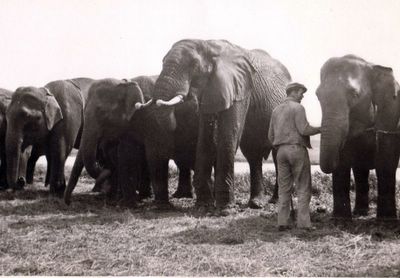
This picture gives a better idea of his size in relation to the rest of the herd.
As I mentioned before, when I was with the Polack Show in the 1960's, Barbara and I were invited to Parley Baer's home where he introduced me to Mr. Allen who was now a Hollywood Executive. We had a great day talking elephants but when the subject of "Safari" came up he said it was a sad story, evidently he had unknowingly come from the Zoo terminally ill from TB. He seemed to be fine the first season but gradually in 1936 he became more and more listless and toward the end of the season moving back and forth from the train, Eddie had to drive him from horseback to make him keep up with the herd.
Back in the Rochester, Ind. Winter Quarters, "Safari" died on Thanksgiving Day.
On that sad note I will conclude by mentioning the recent deaths in our Circus Community here in Florida, seems that this often happen in groups. While discussing this with Bill Strong he said, "God must be taking out a show next Spring".
|
![]()
9 comments:
I believe Safari was only 19 years old when he died in 1936.
I thought he was older since Hugo Schmitt said he was big when brought to the Detroit in 1928 but an 11 year old African male can be pretty big.
I thought he was older since Hugo Schmitt said he was big when brought to the Detroit in 1928 but an 11 year old African male can be pretty big.
Can anyone explain to me if an elephant shows no sign of TB for three years, why must it be confined and poked with needles for another year to keep testing for TB. If the elephant was that sick, why is it allowed to move into another state as a few years ago it was prohibited to move an elephant to Florida. It is scary to me to read that a beg is out for needles, tubes, etc for the elephant to be poked with and blood drawn to be sent to another place for testing. The elephant is supposed to be given a retirement not to be made a frankinstien experiment by some one who had a fondness for needles.
Tuberculosis is difficult to detect in elephants; trunk washs have proven to be very unrelieable. For more information, read the summary of the Tuberculosis workshop: http://www.elephantcare.org/updates.htm
The new blood tests are much more relieable and necessary to find out if the Hawthorn elephants are really TB free.
Looks like a witch hunt to me. If REAL vets could not find TB maybe the amatures in Tenn can find some. Just another way to take credit for some one elses work. Also another way to get money from the unknowing public. Trunk washes have been good enough until the Hawthorn Elephants got targeted by someone who thought they had made a killing. Free Bees for life. We will see how long this testing last when the money dries up. A marical cure for sure.
Interesting comment on the validity of trunk washes. That piece of business cost me $100 per elephant annually and at the time I thought it was something the USDA had come up with to keep the Animal Rights people off their back.
Do you think we will ever get a refund for a worthless test? I love the way people who do not live with elephants can become experts on their care. I am supposed to keep quite about this for a while, but it just riles me to no end. Having no heat in 3 degree weather brings out the bitchness in me. Notice Tenn has been in the teens and twentys lately. Noticed also the Hawthorn elephants will have to feed and bath themselves in Tenn. No meals on wheels for those guys. Hope the ponds don't freeze over so they can';t get a bath. Riches to rags for them. This is going to be an interesting year. Bet the elecam has a lot of tech problems. Then again tapes can be messed with as I have already learned. You get to see what they want you to see. Nuff Ced
I read somewhere Safari was only about nine feet 2 inches tall at the shoulder.
Maybe that was his age when he was at the Detroit zoo.
Post a Comment